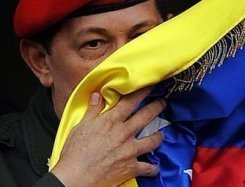 Venezuela marked its independence bicentennial Tuesday with President Hugo Chavez's supporters buoyed by his return but sobered by his cancer battle ahead.
Venezuela marked its independence bicentennial Tuesday with President Hugo Chavez's supporters buoyed by his return but sobered by his cancer battle ahead.Sequestered for nearly four weeks in Cuba where he underwent treatment for a cancerous tumor, Chavez returned to Caracas a day earlier in a show of strength, rallying a crowd of thousands with his trademark gusto.
While he said his illness would prevent him from taking part in the full complement of celebrations, the anti-American firebrand has a gift for theatrics and lengthy public speeches, and his appearance at the heart of the commemorations -- including a lavish military parade -- could not be ruled out.
State broadcaster VTV showed Chavez on Tuesday greeting several foreign ministers and representatives from some 17 Latin American nations as the day's events got under way, while Uruguayan President Jose Mujica made a surprise visit to join the festivities.
Chavez sent out warm messages via Twitter, telling followers on the micro-blogging service: "Oh, Venezuela, happy birthday my dear homeland! Happiness today and forever, my brothers! Viva Venezuela!!!!"
The nation is among several in South and Central America to have shaken off the yoke of European colonialism in the early 19th Century, but while he commemorated his country's independence he warned of an intense personal health challenge on the horizon.
In his Monday speech the 56-year-old former paratrooper admitted he had been through some "very difficult hours" during treatment, cautioned that he had only gone through the "first stage" of the battle, and urged patience and strength on the march toward a "final victory."
"I am sure you completely understand the challenges of this battle. Don't let anyone believe that my presence here on this 4th of July means we have won the battle," he said.
It was almost four weeks ago, on June 8, that the Venezuelan leader arrived in Cuba on a routine official visit to his longtime leftist allies in Havana, who are heavily dependent on oil exports from Latin America's main producer.
Two days later he was rushed to hospital for emergency treatment on what Cuban and Venezuelan officials said was a pelvic abscess. Conflicting reports and mounting speculation about his condition followed.
As days ran into weeks, the absence of a man ordinary Venezuelans were used to seeing on television, hearing on radio, or reading on Twitter every day led to naval-gazing about political life without the omnipresent leader.
Last week eyebrows were raised further when Venezuela postponed the inaugural summit of a new Americas bloc -- Chavez had been due to host the regional gathering, a pet project that excludes Canada and the United States.
Then on Thursday, Chavez made a dramatic announcement on state television via video from Havana, telling his nation that doctors had found and removed a cancerous growth.
With the country reeling, officials have since confirmed the tumor was in his pelvic area but that all the president's organs are fine. They have not said what type of cancer it was or what the longer-term prognosis is.
Chavez, who has been elected three times since 1999 and survived an aborted coup in April 2002, has already announced his intention to run for another six-year term in 2012.
His populist anti-capitalist, anti-imperialist rhetoric, handouts to the poor, and image as a regional powerbroker have helped him retain strong support, which hovers around 50 percent in most surveys.
The Venezuelan military, which briefly overthrew Chavez in 2002, has pledged its full allegiance.
0 comments:
Enregistrer un commentaire